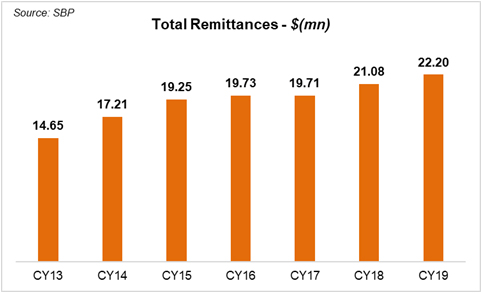 Compared to a slower first quarter not only due to no significant increase in remittances from conventional corridors like Saudi Arabia, some GCC countries and the UK but also a decline in year-on-year remittances from UAE, the second quarter has seen visible improvement. The data from State Bank of Pakistan shows that the receipts of foreign exchange from the overseas Pakistanis registered growth of over 3 percent year-on-year. However, a look at the 2QFY20 aggregates show that the growth in remittances picked up by around 8 percent year-on-year; the slow growth rate for 1HFY20 was primarily due to weaker 1QFY20 where the inflows from expats slipped by 1.4 percent year-on-year. Remittances in December 2019 as per the data released by SBP grew by 20 percent year-on-year, touching a seven-month high.
Compared to a slower first quarter not only due to no significant increase in remittances from conventional corridors like Saudi Arabia, some GCC countries and the UK but also a decline in year-on-year remittances from UAE, the second quarter has seen visible improvement. The data from State Bank of Pakistan shows that the receipts of foreign exchange from the overseas Pakistanis registered growth of over 3 percent year-on-year. However, a look at the 2QFY20 aggregates show that the growth in remittances picked up by around 8 percent year-on-year; the slow growth rate for 1HFY20 was primarily due to weaker 1QFY20 where the inflows from expats slipped by 1.4 percent year-on-year. Remittances in December 2019 as per the data released by SBP grew by 20 percent year-on-year, touching a seven-month high.

Weakness in 1QFY20 largely came from the 7.2 percent decline from UAE and SBP’s latest quarterly report highlights that it was due to the challenging employment situation where remittance outflows from UAE to other major recipients also declined. It further adds that a significant number of workers have returned from the UAE as well.

While not much has changed in UAE, 2QFY20 saw a reverse in the declining trend, and remittance from UAE increased by 8 percent year-on-year. Remittances in 2QFY20 were further supported by growth in Saudi Arabia, other GCC, USA and UK. Analysts are calling this improvement a result of some stability in oil prices along with diplomatic efforts by the current government with Saudi Arabia and UAE in particular that has improved the employment scenario.

One reason for better remittance flows from UAE and Saudi Arabia could be attributed to what SBP points out in its quarterly report: “PRI has aided the Pakistan Post and the National Bank of Pakistan to jointly enhance their tie-ups with 41 money transfer operators in the UAE and Saudi Arabia during the current year.”

Some of the improvement in remittances can also be seen in the growth registered in the number of Pakistanis going abroad. According to the data by the Bureau of Emigration and Overseas Employees, number of Pakistanis going to Saudi Arabia witnessed a growth of 230 percent year-on-year in CY19 versus three-year consecutive decline in CY16, CY17 and CY18 (12%, 69% and 30% respectively). However, growth in the number of Pakistanis going to UAE remained flat in CY19 versus decline in CY16, CY17, CY18.






















Comments
Comments are closed.